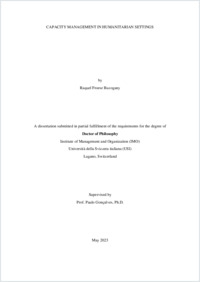Capacity management in humanitarian settings
- Froese Buzogany, Raquel
- Gonçalves, Paulo (Degree supervisor)
- 2023
PhD: Università della Svizzera italiana
Humanitarian organizations
Capacity building
Material convergence
Humanitarian operations education
Online multiplayer experiments
English
Humanitarian organizations (HOs) are facing mounting pressure to provide effective and efficient assistance to those in need, while funds are limited and needs continue to rise. One of the most effective ways for HOs to increase their efficiency is to focus on improving their capacity. This dissertation aims to improve capacity building in humanitarian operations at different levels: with a short-term relief strategy to assist more beneficiaries in need and with a long-term capacity building strategy to increase organizational capacity. The second chapter of this dissertation focuses on how to manage a material convergence situation in disasters. The principal aim of this chapter is to more efficiently allocate capacity given all constraints and feedback mechanisms. Creating a system dynamics model with the causal relationships that characterize material convergence, ten policies are analyzed exploring their effectiveness according to three metrics and their unintended consequences. Four policies perform consistently better by reallocating human resources to manage high priority material and results indicate that the admission control policy implementation should be further explored. The third chapter empowers humanitarian professionals in their capacity-building journey. It presents materials provided to those enrolled in the Master in Humanitarian Logistics and Management program as support for theses methodological and research sub-processes with a deliberate practice approach. The summative evaluation shows that implementation of the thesis learning activities led to statistically significant higher graduation rates as well as an increase in the number of outstanding theses. Finally, the fourth chapter provides a step-by-step guide to implementing online multiplayer experiments using the specific example of examining humanitarian operations from a common-pool resource perspective. The chapter sheds light on several player behavior challenges, including handling several players simultaneously, keeping them engaged, and avoiding player mischievousness. This chapter paves the way for further exploration of capacity management in the humanitarian context and holds the potential to expand research scope by supporting researchers from other fields that have traditionally relied on field experiments for data collection.
- Collections
- Language
-
- English
- Classification
- Economics
- License
-
License undefined
- Open access status
- green
- Identifiers
-
- NDP-USI 2023ECO004
- URN urn:nbn:ch:rero-006-120005
- ARK ark:/12658/srd1325724
- Persistent URL
- https://n2t.net/ark:/12658/srd1325724
Statistics
Document views: 293
File downloads:
- 2023ECO004: 360
